More than a dozen hospitals have declared “critical incidents” as the flu outbreak worsens.
Health leaders warned last night that the NHS is facing “exceptionally high demand”, with case numbers already double last year’s peak.
About 5,000 beds a day are occupied by patients infected with the virus and officials expect the crisis to deepen this week when children return to school after the Christmas holidays.
Patients have been forced to wait up to 50 hours in the emergency room before finally being admitted to the wards.
And ambulance queues of up to 18 people have formed outside hospitals as they wait hours to drop off arrivals, leaving them unable to respond to further 999 calls.
Vowing to make improvements, Health Secretary Wes Streeting admitted he was “distressed and ashamed” to see the situation in which sick Britons find themselves.
Meanwhile, some medical staff have been ordered to wear masks again in a bid to stop the spread of infections, and hospitals are imposing stricter restrictions on visitors.
Patients at Liverpool Royal Hospital, pictured, have been told to visit their GPs or call 111 amid large numbers of people attending the A&E department, unless it is an emergency .
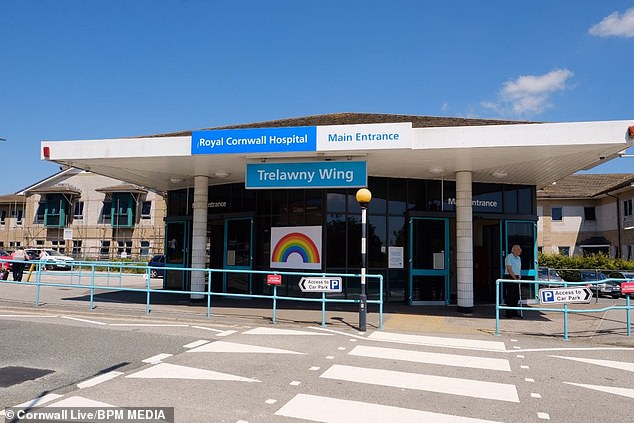
The Royal Cornwall Hospital, pictured, has said its services were under “significant pressure” after a critical incident was declared.
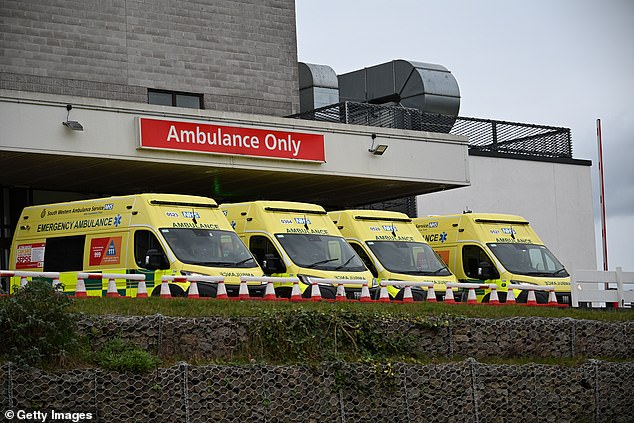
Ambulances wait outside the Royal Cornwall Hospital emergency department on January 4.
Professor Sir Stephen Powis, national medical director for NHS England, urged eligible patients to get a flu vaccine.
He said those who are vulnerable or have respiratory conditions should “stay warm” and stock up on medication before temperatures drop to “dangerous” levels in the coming days.
Hospitals in Northamptonshire, Cornwall, Liverpool, Hampshire, Birmingham and Plymouth are among those battling “critical incidents”, which can be declared when health and care services are so busy that special measures are needed to restore normal functioning.
East Midlands Ambulance Service NHS Trust also declared the first critical incident in its history due to a combination of “significant patient demand, pressure within local hospitals and flooding”.
Non-urgent patients have been warned they face long waits in A&E and urged to “consider other options” such as contacting their GP, visiting a pharmacy or calling NHS 111.
Sir Stephen said: “Frontline NHS staff are under significant pressure and demand shows no signs of letting up – latest data shows flu cases soared to around 5,000 a day in hospitals at the end of the year past and multiple trusts across the country declared incidents to help them manage the additional pressure on services.
‘There was an average of one visit every eight seconds to the NHS flu advice page over the past week and, as well as flu, hospitals are also seeing continued pressure from Covid, RSV (respiratory syncytial virus) cases ) and norovirus, as the “quad-demic” continues to increase pressure on all services.
“We expect to see a further rise in flu cases as children return to school, along with nasty bugs like norovirus, which remains highly infectious up to 48 hours after symptoms disappear.”
It comes as fears grow over a virus, called human metapneumovirus (hMPV), which is said to be increasing in China.
Data suggests cases of the infection, which presents flu-like symptoms, have doubled in the last month.
Speaking on LBC Radio, Streeting said some ambulances simply take patients to A&E to die because there is not “the right care available at the right time and in the right place”.
He acknowledged that hospitals might refuse to accept new arrivals because their wards are full, but warned this was creating an “intolerable risk for patients.” The minister pledged to do “everything he can” to “ensure that year on year we see consistent improvement” but admitted it will take time.
He added: “I feel really distressed and embarrassed, in fact, by some of the things patients are experiencing and I know staff in the NHS and social care services feel the same.”
“They go to work, they make an effort and it is very distressing for them to see people in these conditions.”
Saffron Cordery, acting chief executive of NHS Providers, said: “Wards and A&E have been under relentless pressure, with a knock-on effect on ambulance handovers, but NHS staff and trust leaders continue to do everything they can to to treat patients as quickly as possible. as much as possible.’
Dr Adrian Boyle, president of the Royal College of Emergency Medicine, said: “This is a major flu outbreak, but the problem is there is simply no capacity to deal with it.”
“So it’s really the straw that breaks the camel’s back.”
The Royal Liverpool University Hospital has been in critical incident status since Monday night.
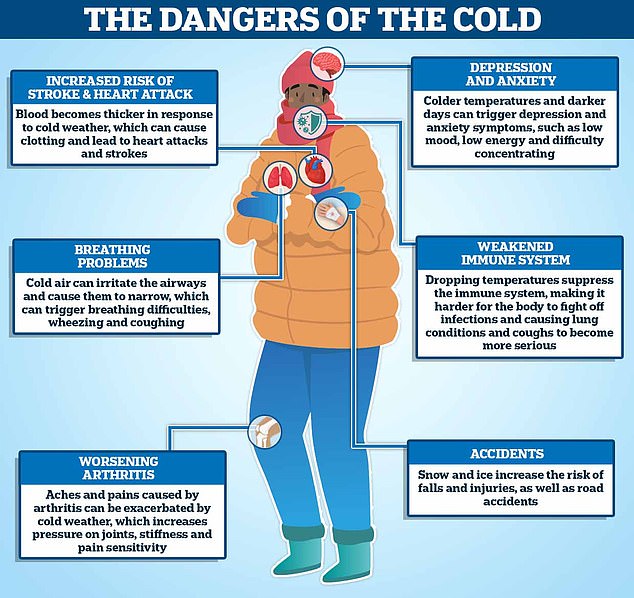
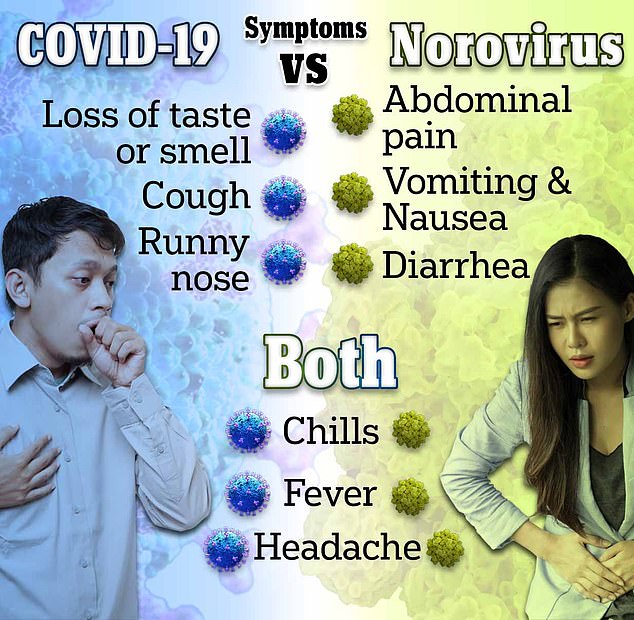
Norovirus may appear similar to Covid symptoms, with both viruses causing chills, fever and headaches.
It is understood that the longest time a patient waited to be admitted to a hospital ward was 50 hours.
Welsh Ambulance Services also declared a critical incident. James Evans, the Welsh Conservative’s health spokesman, said 18 ambulances had queued outside Grange Hospital near Newport, South Wales.
York and Scarborough hospitals are urging patients to go to “overcrowded” emergency departments alone.
Dr Ed Smith, from York and Scarborough University Hospitals NHS Foundation Trust, said: “While we understand that it is appropriate for a friend or family member to accompany a child or as a carer, for example, if patients can attend alone, This will help free up much-needed space for other patients.’
Meanwhile, in Scotland, hospitals are battling the pressures of extreme weather and an “extraordinary rise” in flu, with some departments approaching 400 per cent capacity and patients receiving “unsafe care”.
Large areas of the country are bracing for more snow and ice, which could send more patients to the emergency room for falls and winter illnesses.
The latest figures for the week ending December 29 (the last full week of 2024) showed that only 58.4 per cent of A&E patients were treated within the four-hour target, the fifth-worst performance on record in figures weekly dating back to 2015.
November 2024 was the worst November on record in terms of ER waits, with only 65.8 percent treated within the expected time frame.
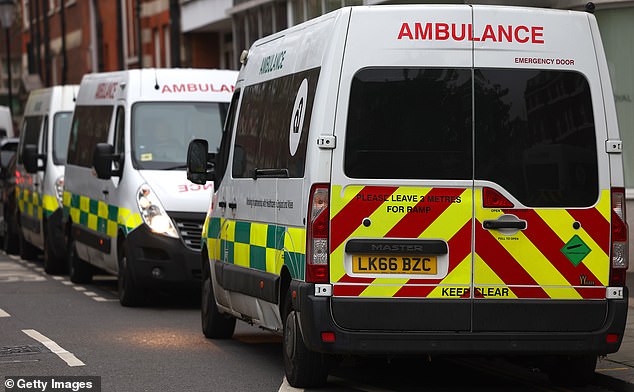
Ambulances are seen parked outside a London hospital on December 27, 2024 in London, England.
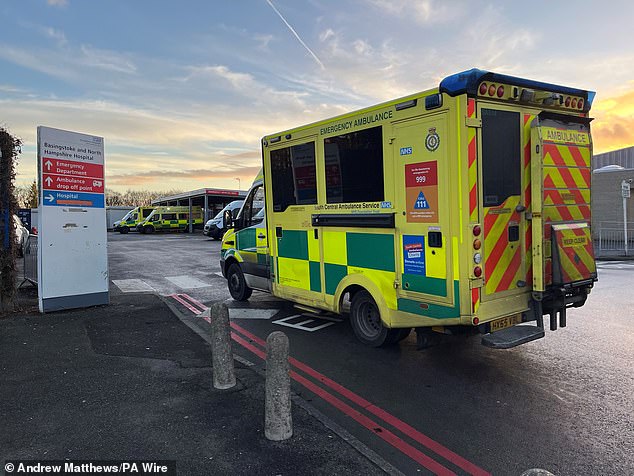
Ambulances outside Basingstoke and North Hampshire Hospital on January 7
NHS Grampian declared a critical incident in November in which some ambulance patients were diverted to hospitals outside the health board area, and shortly before Christmas, the Scottish Ambulance Service put teams on their highest level of emergency due to “significant pressure.”
Dr Fiona Hunter, deputy chair of RCEM Scotland, said bed blocking has stalled the flow of patients.
She said: “The system was already under extreme pressure, and this huge flu surge and cold snap are likely to be the final straw.”
Dr Hunter said some departments were “close to 400 per cent capacity – four times as many patients as cubicle spaces”.
He added: ‘Our patients receive unacceptable, undignified and unsafe care in the corridors and in the back of ambulances. The main problem is that we cannot transfer our patients to high dependency wards or units.
“As expected, we are paralyzed, in the depths of a winter crisis, and our patients and staff are the ones suffering.”
However, Scotland’s Health Secretary Neil Gray said: “Thanks to the strong preparation, dedication and hard work of staff across the health and social care service, our services continue to perform well.”
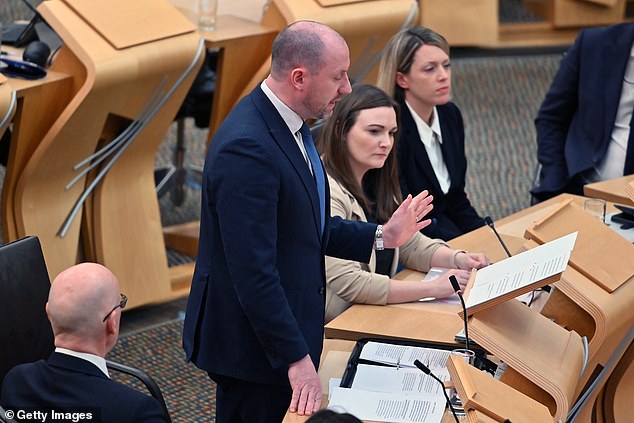
Scottish Health Secretary Neil Gray speaks at Holyrood on January 7.
There were 1,537 emergency admissions to Scottish hospitals due to flu in the last week of 2024, significantly more than the 436 in the same week the previous winter.
Scottish Conservative health spokesman Dr Sandesh Gulhane said Gray was “kidding himself if he thinks anything in his NHS winter plan has been successful”, while Scotland’s Royal College of Nursing said health and social care services “entered 2025 under pressure and under pressure”. staffed’.
Last winter, all adults between 50 and 65 years old were included in the free vaccination program, but the eligible age was increased to 65 years old this winter.
Around 1.2 million Scots have received flu jabs so far this season, compared to 1.6 million in the same period last winter.


